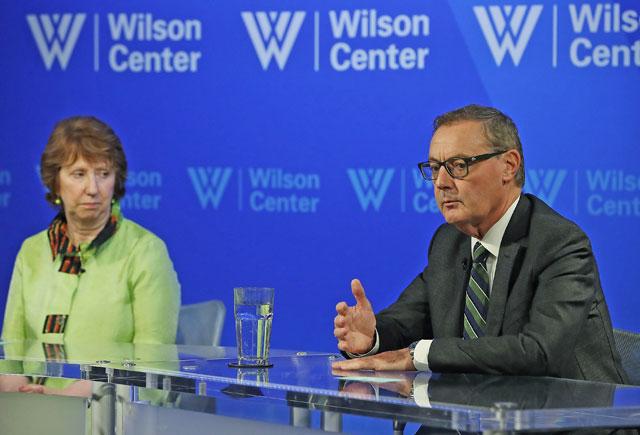You are here
Iran nuclear talks: bridging the gaps in New York
By AFP - Sep 16,2014 - Last updated at Sep 16,2014
NEW YORK — Iran and six powers resume Thursday in New York negotiating a potentially historic deal to ease fears that Tehran might develop nuclear weapons after 12 years of failed diplomacy and rising tensions.
The five permanent members of the UN Security Council plus Germany (the P5+1) want Iran to scale down its nuclear activities to make any dash to make a bomb extremely difficult.
In return Tehran, which denies wanting nuclear weapons and says a peaceful atomic programme is its right, wants the lifting of UN and Western sanctions causing its economy major problems.
In July negotiators gave themselves four more months, until November 24, to strike a deal, with US Secretary of State John Kerry saying this was the "best chance we've ever had to resolve this issue peacefully".
The talks in New York will be at the level of political directors but foreign ministers from Iran and the six powers — present in New York for the UN General Assembly — will likely also meet.
It is unclear how long the talks will last or what the outcome will be, although diplomats say that with more than two months remaining before the deadline, it is highly unlikely that this will be the final round.
Herewith a look at the main issues:
Enrichment: The thorniest problem by far is uranium enrichment, a process rendering the material suitable for power generation and medical uses with centrifuge machines but also, at high purities, for a bomb.
Ayatollah Ali Khamenei, supreme leader, said in July that Iran wants to ramp up its enrichment capacities to industrial level. But the powers want Iran to slash them. Both sides have called for more "realism" on this point.
Progress: Progress has been made in other areas. These include greater oversight for UN inspectors, on the future of Iran's existing uranium stockpile and what Kerry called a "different purpose" for Fordo, Iran's second main enrichment site under a mountain near Qom.
Another is Iran's apparent willingness to change the design of a new reactor it is building at Arak in order to ensure that it produces much less plutonium, the alternative to highly-enriched uranium for a bomb.
Timing: Apart from enrichment there are other tricky aspects, not least the duration of the mooted accord. Washington wants Iran's nuclear activities limited for a "double-digit" number of years, Tehran considerably less.
Another difficulty is the pace at which sanctions would be lifted and how to tie the relief to certain "milestones" by Iran. The lifting of sanctions by the UN Security Council and a sceptical US Congress also presents legal difficulties.
Skeletons in the cupboard: Another potential stumbling block is the UN atomic watchdog's probe into the "possible military dimensions" of Iran's programme — alleged work on developing a nuclear weapon before 2003 and possibly since.
After years of rejecting these allegations out of hand, progress at last began to be made this year but Iran failed to provide information on two out of around 12 areas of suspect areas to the watchdog by an August 25 deadline.
Another extension?: Although negotiators insist the November 24 deadline is set in stone, experts have begun to speculate about yet another extension, not least because of the current turmoil in the Middle East.
"Luckily, the alternative to a comprehensive deal is not necessarily a collapse of diplomacy and a return to escalatory sanctions and centrifuge enhancements, with military action again on the horizon," said Mark Fitzpatrick from the International Institute for Strategic Studies.
"The more likely alternative, rather, is another interim deal, probably one with new conditions, such as locking in an agreement to change the design of the Arak reactor so that it produces less plutonium."
Related Articles
Negotiators from Iran and six world powers come together in Vienna this week for a final round of talks on securing a deal over Tehran's nuclear programme by a November 24 deadline.
TEHRAN — A top adviser to Iran's supreme leader has hinted Tehran could boost its uranium enrichment to 5 per cent for "peaceful" aims, ahea
PARIS/WASHINGTON — The remaining parties to the Iran nuclear deal have warned the United States that its decision to withdraw from the pact












